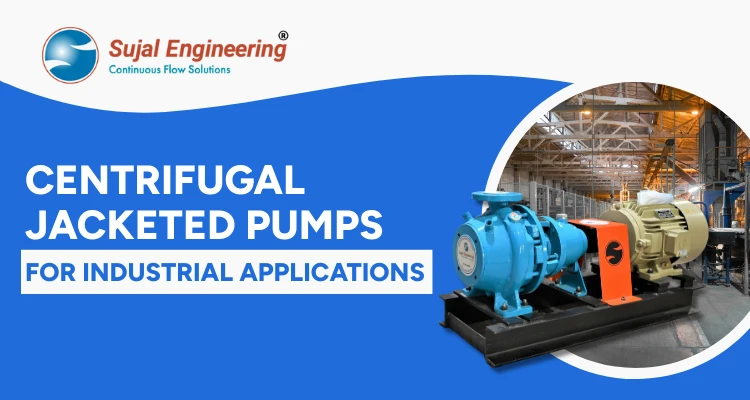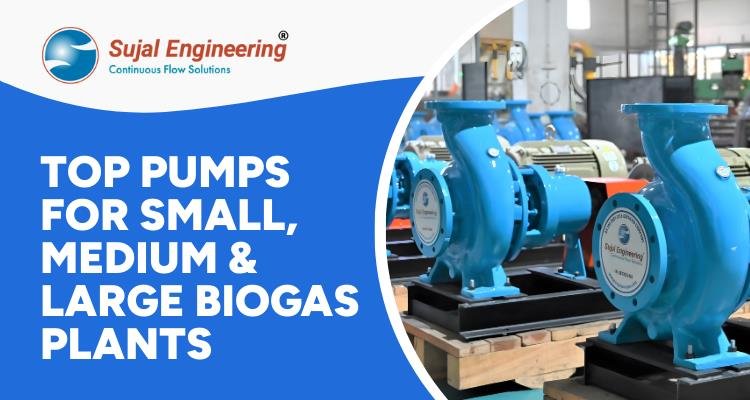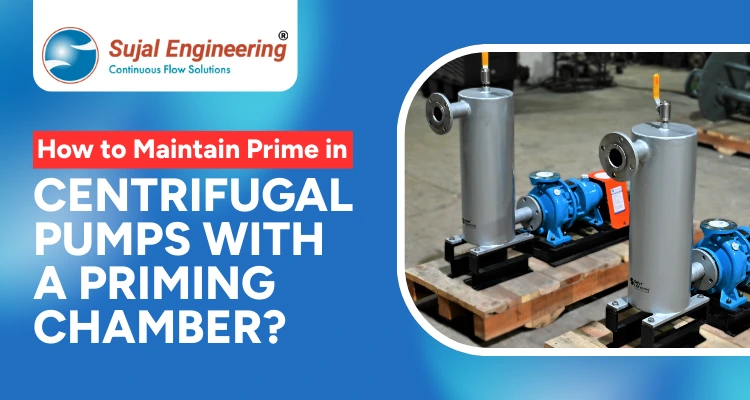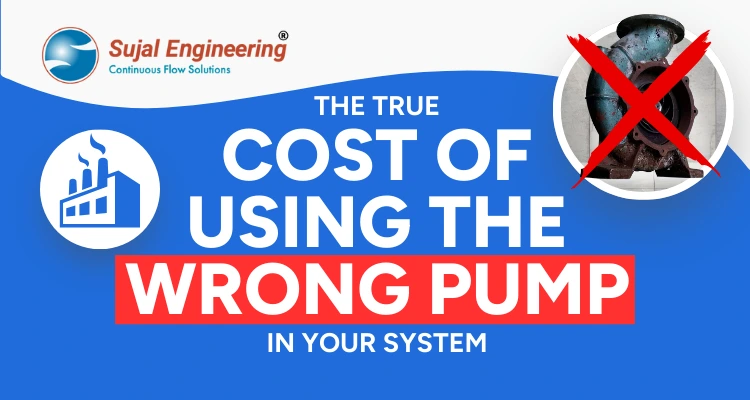Centrifugal Jacketed Pumps for Industrial Applications

When dealing with temperature-sensitive fluids in industrial processes, centrifugal jacketed pumps represent the gold standard for maintaining precise thermal control while guaranteeing reliable fluid transfer. These specialized pumps combine the efficiency of centrifugal technology with advanced temperature management capabilities, making them highly valuable across the chemical processing, pharmaceutical manufacturing, and food production industries.
Sujal Engineering, a leading industrial pumps manufacturer, has been at the center of designing and manufacturing high-performance centrifugal jacketed pumps that match the demanding requirements of modern industrial applications. With decades of expertise in pump technology, we understand the critical role these systems play in maintaining product quality and process efficiency.
What Are Centrifugal Jacketed Pumps and Why Do They Matter?
Centrifugal jacketed pumps are specialized pumping systems featuring a double-wall construction where the outer jacket allows for heating or cooling media circulation around the pump casing. This design maintains the pumped fluid at a specific temperature throughout the transfer process.
Unlike standard centrifugal process pumps, jacketed variants avoid temperature fluctuations that could compromise product quality, cause separation, or lead to viscosity changes. The jacket typically circulates steam, hot oil, or cooling water depending on whether heating or cooling is required.
The key differentiator is their ability to maintain consistent thermal conditions, which is required for processes involving chocolate manufacturing, polymer processing, or chemical process pumps handling temperature-sensitive compounds.
How Do Centrifugal Jacketed Pumps Work in Industrial Settings?
The operation principle combines standard centrifugal pump mechanics with advanced thermal management. The impeller creates centrifugal force to move the primary fluid, while the jacket maintains optimal temperature through continuous circulation of heating or cooling medium.
Here’s the step-by-step process:
- Primary Flow Path: The main fluid enters through the suction port, gets moved faster by the rotating impeller, and exits through the discharge port under pressure.
- Thermal Management: At the same time, the jacket circulates heating medium (like thermic fluid or steam) or cooling medium around the pump casing to maintain the desired temperature.
- Temperature Control: Advanced systems include temperature sensors and control valves that automatically adjust the jacket fluid flow rate based on process requirements.
This dual functionality makes jacketed pumps superior to standard stainless steel centrifugal pumps when temperature control is critical for product quality or process safety.
Why Are Jacketed Pumps Important for Temperature-Sensitive Applications?
Temperature control directly impacts product quality, process efficiency, and operational safety in many industrial applications. Without proper thermal management, several problems can occur:
- Viscosity Changes: Many fluids become too thick or thin when temperature fluctuates, affecting pump performance and flow rates. Hot oil circulation pumps with jacketing prevent this issue in polymer processing.
- Crystallization Prevention: Certain chemicals and food products melt at lower temperatures, potentially clogging the pump and downstream equipment.
- Product Degradation: Pharmaceuticals, food products, and specialty chemicals can lose their properties or become dangerous due to temperature variations.
- Energy Efficiency: Maintaining optimal temperature reduces the energy required for downstream heating or cooling processes, making operations more cost-effective.
For industries processing aggressive fluids or high-temperature process pumps applications, jacketed designs provide both temperature control and corrosion resistance.
Which Industries Benefit Most from Centrifugal Jacketed Pumps?
Chemical and Petrochemical Processing leads the adoption of jacketed pump technology. Chemical centrifugal pumps with jacketing handle temperature-sensitive components, polymers, and specialty chemicals while maintaining precise thermal conditions.
Pharmaceutical and Food Processing industries base heavily on these pumps for maintaining sterile conditions and product integrity. Applications include chocolate tempering, syrup processing, and pharmaceutical compound manufacturing.
Oil and Gas Operations utilize jacketed pumps for heavy crude oil transfer, where maintaining high temperatures prevents solidification and guarantees smooth flow through pipelines.
Manufacturing Industries including textiles, ceramics, and paper production use these pumps for processing heated dyes, ceramic slurries, and various temperature-sensitive materials.
Each industry benefits from the enhanced control and reliability that jacketed pumps provide over conventional industrial pumps for ZLD plants or standard process applications.
What Are the Key Advantages of Centrifugal Jacketed Pumps?
Precise Temperature Control stands as the primary advantage, guaranteeing consistent product quality and process reliability. This control stops costly product losses and rework.
Enhanced Process Efficiency results from maintaining optimal fluid viscosity, reducing energy consumption for downstream heating or cooling systems.
Reduced Maintenance Costs occur because proper temperature control prevents crystallization, solidification, and thermal stress that can damage pump components.
Improved Safety is achieved through better control of hazardous materials and reduced risk of thermal runaway reactions in chemical processes.
Versatile Material Options including PP (Polypropylene) pumps, PVDF pump constructions, and specialized acid transfer pump designs accommodate various chemical compatibilities.
Extended Equipment Life results from reduced thermal stress on pump components and connected piping systems.



How to Choose the Right Centrifugal Jacketed Pump for Your Application?
Flow Rate and Head Requirements form the foundation of pump selection. Calculate your system’s flow requirements and total dynamic head to ensure the pump operates within its efficiency range.
Temperature Range determines the jacket design and materials. High-temperature applications may require specialized air-cooled pump designs or improved insulation systems.
Chemical Compatibility drives material selection. Polypropylene pumps for chemicals work well with acids, while stainless steel handles a broader range of applications.
Process Conditions including pressure, suction conditions, and system layout influence pump configuration and mounting options.
Control Requirements determine whether you need manual temperature control or automated systems with feedback loops and process integration.
Consider consulting with experienced pump manufacturers like Sujal Engineering to secure optimal pump selection and system design.
Centrifugal Jacketed Pumps vs. Standard Industrial Pumps:
| Feature | Centrifugal Jacketed Pumps | Standard Centrifugal Pumps |
| Temperature Control | Precise heating/cooling capability | No thermal management |
| Initial Cost | Higher due to jacket complexity | Lower initial investment |
| Operating Efficiency | Higher for temperature-sensitive fluids | Standard efficiency range |
| Maintenance Requirements | Moderate (jacket + pump systems) | Lower complexity |
| Application Range | Specialized temperature-critical processes | General fluid transfer |
| Energy Consumption | Reduced system-wide energy usage | Standard pump energy only |
| Product Quality Control | Excellent for sensitive materials | Limited for temperature-critical applications |
What Are the Most Common Applications for Centrifugal Jacketed Pumps?
Polymer and Resin Processing involves transferring heated polymers that solidify at room temperature. Heavy-duty pump solutions with jacketing maintain fluidity throughout the transfer process.
Pharmaceutical Production uses jacketed pumps for active pharmaceutical ingredients (APIs) that require specific temperature ranges to maintain quality and stability.
Food Processing Operations including dairy processing, syrup production, and oil refining depend on temperature-controlled pumping for product quality and safety.
Chemical Manufacturing includes everything from pumps for aggressive fluids to speciality chemical production where temperature control prevents unwanted reactions.
Hot Oil Systems in various industries use thermal oil transfer pumps to circulate heating media while maintaining precise temperature control.
Best Practices for Centrifugal Jacketed Pump Maintenance and Operation
Regular Temperature Monitoring guarantees that the jacket system maintains optimal conditions. Install reliable temperature sensors and establish monitoring protocols.
Jacket System Maintenance includes regular inspection of heating/cooling circuits, checking for leaks, and providing proper insulation integrity.
Pump Performance Tracking monitors flow rates, pressure, and efficiency to detect early signs of wear or fouling that could affect performance.
Preventive Maintenance Scheduling should fix both the primary pump components and the jacket system to ensure reliable operation.
Proper Startup and Shutdown Procedures prevent thermal shock and ensure safe operation, especially important for high-pressure centrifugal pumps with jacketing.
System Integration with process control systems enables automated temperature management and improves overall process efficiency.
Working with experienced industrial pump manufacturers ensures access to proper maintenance protocols and technical support throughout the pump’s lifecycle.
Conclusion:
Centrifugal jacketed pumps deliver the best temperature control and reliability for critical industrial processes. When product quality and process efficiency matter most, these specialized pumps provide the precision your operations demand.
Sujal Engineering combines decades of pump manufacturing expertise with the latest jacketed pump technology. Our energy-efficient pump systems and complete industrial knowledge ensure optimal solutions for your temperature-critical applications.
Ready to enhance your process efficiency? Contact Sujal Engineering for expert consultation on centrifugal jacketed pump solutions created according to your specific requirements.
Frequently Asked Questions About Centrifugal Jacketed Pumps
Q: What’s the difference between heating and cooling jacket applications?
A: Heating jackets use steam, hot water, or thermic fluid for viscous materials. Cooling jackets use chilled water or refrigerants to prevent overheating.
Q: Can jacketed pumps handle abrasive or corrosive fluids?
A: Yes, with proper material selection. PVDF pumps offer chemical resistance, while slurry pump designs handle abrasive materials effectively.
Q: How do I determine if I need a jacketed pump versus a standard pump with external heating?
A: Choose jacketed pumps when precise temperature control is critical or when maintaining consistent temperature throughout pumping is required for product quality.
Q: What maintenance is required for the jacket system?
A: Regular jacket inspection, heating/cooling medium monitoring, and insulation checks. Most pump suppliers provide detailed maintenance schedules.
Q: Are jacketed pumps more energy-efficient than alternatives?
A: Yes, for temperature-critical applications. They eliminate separate heating/cooling equipment and reduce energy losses compared to external temperature control systems.




